F-bombs aside, the controversial documentary ‘Bully’ really is shocking

VICTIMIZED AGAIN | Fourteen-year-old Alex suffers the physical and verbal abuse of students, but also the thoughtlessness of adults, in ‘Bully.’
ARNOLD WAYNE JONES | Life+Style Editor
………………….
3.5 out of 5 stars
BULLY
Directed by Lee Hirsch.
Rated PG-13. 100 mins.
Now playing in wide release.
………………….
Probably the best thing that could have happened to Bully was the controversy over its rating.
The documentary, which follows about half a dozen teens and tweens in small town America, being physically and mentally abused by other kids and, in most instances, the system, got slapped with an R rating for language. The director, Lee Hirsch, and the distributor, The Weinstein Co., objected, and with good reason: The F-bombs were all dropped by kids to other kids (and essential parts of the bullying experience) and a hard R might prevent the film’s target audience from even seeing it.
As with all forms of censorship, even those as mild as this, the newsworthiness fueled interest in the film. How bad could the language be?
What was silly about the MPAA rating was that language was the deciding factor at all. What’s really disturbing about Bully is less what’s said than the acts of domestic terrorism it chronicles on school buses and playgrounds across the nation. The movie will be hard for kids to watch, but I can hardly imagine a more necessary and provocative way to get kids (and their parents) to talk about what’s going on in their lives. It’s shocking and disturbing.
Not that the film is perfect; it’s not. Hirsch takes a rangy approach to the subject, covering (in unequal fashion) several threads. Some, like 14-year-old Alex of Sioux City, Iowa, garner the lion’s share of screen time; others, like two different boys named Tyler, we see other through the eyes of friends and family; they had been driven to suicide.
Of the bullied kids profiled, only one — 16-year-old Kelby of Tuttle, Okla. — is specifically LGBT. The recounts of her ordeal are vile but probably all too familiar to some; messages reading “Faggots aren’t welcome here;” teachers diving her class into three groups (“boys, girls and Kelby”). But none of these actual events are filmed for Bully, and Kelby’s story goes away for long stretches.
Not that the gay kids’ experiences are anything unique. The pride Tyler’s dad shows toward his victimized son is sincere and heartfelt, and what Alex endures borders on the unreal: The nickname “Fish Face;” the physical attacks on the school bus in plain sight of the driver; the appalling indifference and insensitivity of the adults.
In fact, if there’s a villain in Bully, it isn’t the sad, mean teens who inflict such thoughtless cruelty on their weaker classmates, it’s the adults who seem to have turned a deaf ear to the calls for help. Kim Lockwood, a middle school assistant principal, actually blames victims as much for being the target of a bully as the bully himself. She does all but say if he wore a hoodie, he’d deserve to be shot.
Another principal, hopelessly bureaucratic and ignorant to the realities of life in her school, doesn’t believe it when she’s told a warning to an abuser doesn’t stop the abuse.
Perhaps worst of all is Ja’Maya, a 12-year-old sent to juvie after she snapped and brought a handgun on a bus to confront her tormentors. The cops seem totally unconcerned at the root cause of her behavior, instead once again victimizing the child who, rather than suicide, acts out against the bullies.
There are more than a few raise-your-fist and stand-up-and-cheer moments in the film; like An Inconvenient Truth, it outrages you at times, and gives you hope at others. While its through-line isn’t as focused as it could be — for an even better youth-centered documentary, check out this year’s Oscar winner, Undefeated — Bully is a must-see experience for parents and kids … and anyone else who cares about justice, and wants to understand what it means to be different today.
This article appeared in the Dallas Voice print edition April 13, 2012.
